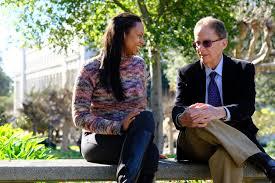
Lisa Eshun-Wilson is in the 4th year of her doctoral program in Biochemistry, Biophysics and Structural Biology and similar to the intersectionality of her program, Lisa grew up at the intersection of several cultures.
Lisa grew up at the intersection of several cultures. “Both of my grandfathers are from Ghana, and both of my grandmothers are from the Czech Republic, so both of my parents are Afro-European. My father was born and raised in the communist Czech Republic and my mother was born in Copenhagen, Denmark but grew up in Apartheid-Era South Africa—where her existence was a crime,” Lisa says. After growing up in environments where racial segregation and political and economic discrimination against nonwhites were pervasive, Lisa’s parents were eager to raise their family in a more open-minded, accepting community.
But she began to wonder: “How do you navigate the dominant academic narrative without fragmenting your identity as an underrepresented student? And are there other ways we can modify or evolve the way we are educated so that we don't lose connections with ourselves, with our communities?”
Lisa credits her parents with supporting her through it all—from growing up in South Central Los Angeles to attending Grinnell College in Iowa as a POSSE Scholar to pursuing her Ph.D. here at UC Berkeley. They inspired her to push boundaries, she says, as well as to challenge the status quo and pursue her dreams. They believed that for their daughter, figuring out who she is was just as important as figuring out what she wanted to accomplish.
Lisa fell in love with research during the Grinnell Science Project (GSP), a pre-college summer program dedicated to introducing students from underrepresented backgrounds to science.
“GSP introduced me to research in biology through a one-on-one workshop where I learned real lab techniques,” Lisa says. “I got so excited about microscopy and decided to become a biochemistry major.”
Even though Lisa was focused on science when she started her Ph.D. program at Berkeley, she had some challenges fitting in. “I noticed that there was a lack of awareness regarding issues that disproportionately affect students from underrepresented minority groups, including unconscious bias, stereotype threat, and imposter syndrome,” Lisa says. Lisa didn’t just notice this; she sometimes experienced what she took to be microaggressions based on her race, gender, and lower socioeconomic status, particularly from her peers. She also saw that there wasn’t a professional space where these issues could be discussed. That all changed when Professor Susan Marqusee approached her at the Annual UC Berkeley Biophysics Retreat and asked how the Molecular and Cell Biology department could improve the experience of underrepresented students, especially African-American students whose participation and retention levels are lower than those of others in the graduate program.
That conversation led them to co-found inclusive MCB (iMCB), a program initiative devoted to introducing first-year graduate students to diversity and inclusion resources as well as training and creating teams of students and faculty committed to enabling all students to reach their potential. Chancellor Carol Christ has noticed the success this young program is already having on campus and thinks it could be a model for science, technology, engineering and math departments across the country.
Throughout the past four years, Lisa cites one key relationship has been especially helpful in providing guidance and support: that of her thesis mentor, Professor Eva Nogales. Along with sharing her research expertise, Professor Nogales has expanded Lisa’s ideas of how her knowledge and life experience could benefit others.
“Professor Nogales is an incredible role model. She challenges me to think about how to combine my scientific, problem-solving, and leadership skills in my future career,” Lisa says. Working with Professor Nogales has helped her grow and become not only a better scientist but also a better advocate for her community, Lisa adds. “She always encourages me to dream bigger.”

